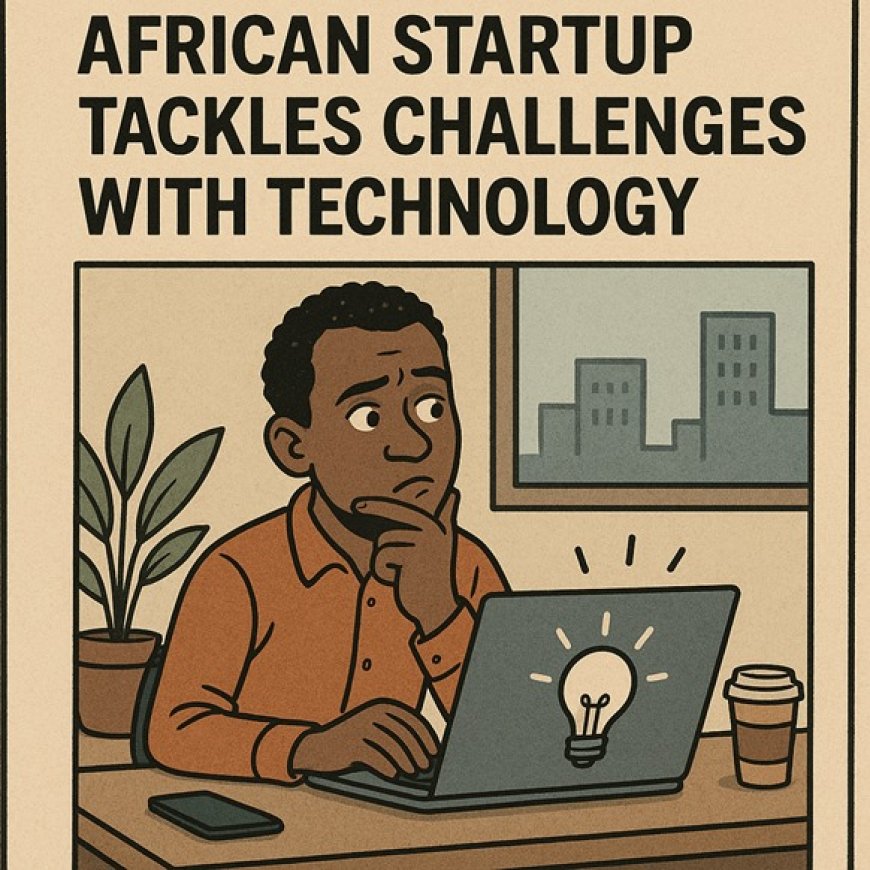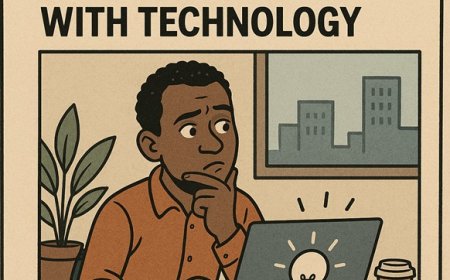African Startups 2025 | Solving Problems | Revolutionising the Continent with Technology
Discover how African startups are solving real-world problems using innovative technologies in finance, agriculture, healthcare, education, and energy. Explore success stories, future trends, and the rise of inclusive, tech-driven solutions across the continent.

In recent years, African startups have emerged as powerful agents of change, leveraging innovative technologies to solve some of the continent’s most pressing challenges. These startups are no longer just tech experiments; they are vital components in transforming sectors like finance, agriculture, healthcare, education, and energy. The drive to address local problems through technology is creating a new economic and social landscape in Africa. This article explores how African startups are solving problems by deploying advanced technology, highlighting key sectors, technological trends, challenges, success stories, and the future outlook.
Why African Startups Are Central to Problem Solving
Africa’s unique socio-economic landscape presents challenges that traditional solutions have failed to adequately address. Limited infrastructure, financial exclusion, healthcare access gaps, and educational shortfalls require context-aware, scalable solutions.
Startups are uniquely positioned to identify and solve these problems by combining local knowledge with innovative technologies. The rise of mobile technology, increased internet penetration, and a young, entrepreneurial population have created fertile ground for startups focused on real-world problem solving.
What Makes African Startups Effective?
-
Mobile-first mindset due to high smartphone usage
-
Youth-driven entrepreneurship
-
Innovation born out of necessity
-
Strong local context awareness
Key Areas Where African Startups Are Making a Difference
Financial Inclusion and Digital Finance
Millions of Africans remain unbanked. Startups are using technology to bridge this financial gap.
Key Innovations:
-
Mobile Money Platforms: Flutterwave, Paystack, and Chipper Cash enable seamless mobile payments.
-
AI-Powered Credit Access: Startups use mobile and social behavior data to offer microloans.
-
Blockchain Technology: Secure, transparent transactions reduce fraud and build trust.
AgriTech: Innovating for Farmers
Agriculture supports over 60% of Africa’s workforce, but inefficiencies persist.
Startup Solutions:
-
Digital Marketplaces: Twiga Foods connects farmers directly with urban retailers.
-
Precision Farming: Drones, IoT sensors, and satellite tech optimize crop yields.
-
AI Weather Forecasting: Helps farmers make climate-resilient decisions.
HealthTech: Bridging Gaps in Healthcare
In remote and underserved regions, healthcare access remains a major concern.
Key Solutions:
-
Telemedicine: Startups like mPharma and Helium Health provide remote consultations.
-
Drone Delivery: Zipline transports vaccines and medicines to hard-to-reach areas.
-
Genomic Research: 54 genes are leading genetic studies for African health conditions.
EdTech: Making Learning Accessible
Education barriers persist across the continent, and startups are responding with tech-driven models.
Innovations Include:
-
Mobile Learning Apps: uLesson offers accessible, curriculum-aligned education.
-
AI-Powered Learning: M-Shule personalizes lessons for student performance.
-
Skills Training: Andela connects trained developers to global tech jobs.
Renewable Energy and Smart Sustainability
Nearly 600 million Africans lack reliable electricity.
Startup Contributions:
-
Solar Pay-As-You-Go: M-KOPA offers affordable solar panels via mobile payments.
-
Smart Energy Tech: IoT helps optimize energy use in homes and communities.
Technologies Empowering African Startups:
-
Artificial Intelligence and Machine Learning: AI and ML help African startups analyze large data sets to optimize services—credit scoring, health diagnostics, agricultural forecasts, and personalized education.
-
Blockchain Technology: Blockchain enhances transparency and security in sectors such as finance, land registries, and supply chains, helping reduce corruption and fraud.
-
Internet of Things (IoT): IoT devices collect real-time environmental, health, and agricultural data, enabling startups to provide timely, data-driven solutions.
-
Mobile Technology and Connectivity: Mobile-first strategies dominate African startups, capitalizing on high smartphone adoption to reach underserved populations effectively.
Challenges African Startups Face in Problem Solving
While African startups are innovative, they face significant obstacles:
-
Infrastructure Limitations: Poor internet connectivity and unstable power supply restrict scalability.
-
Funding Constraints: Although venture capital is growing, early-stage funding remains scarce.
-
Regulatory Barriers: Complex or unclear regulations slow down innovation and market entry.
-
Talent Shortages: The demand for skilled developers, data scientists, and engineers exceeds supply.
-
Market Diversity: Africa’s vast cultural, linguistic, and economic diversity requires highly localized solutions, increasing complexity.
The Ecosystem Supporting African Startups
-
Incubators and Accelerators: Organizations like MEST Africa, CcHub, and iHub provide critical mentorship, networking, and funding opportunities to help startups grow.
-
Investment Landscape: Global and regional investors such as Y Combinator, TLcom Capital, and Partech Africa are fueling the ecosystem by investing in high-potential startups.
-
Government and Policy Support: Governments across the continent are increasingly creating startup-friendly policies, investing in digital infrastructure, and promoting entrepreneurship.
-
Partnerships and Collaborations: Startups collaborate with NGOs, universities, corporations, and multilateral agencies to scale impact and access resources.
Spotlight on Success Stories: African Startups Solving Real Problems
-
Flutterwave: Revolutionizing digital payments, enabling businesses across Africa to accept payments globally.
-
Andela: Building Africa’s tech talent by training software developers and connecting them to international clients.
-
Zipline: Using drones to deliver critical medical supplies to remote areas, saving lives.
-
Twiga Foods: Streamlining food supply chains between farmers and urban markets, improving efficiency and incomes.
-
M-KOPA: Providing affordable solar energy solutions to millions in East Africa through mobile-based payments.
The Road Ahead: Future Trends for African Startups Solving Problems
-
Increased Adoption of AI and Automation: More startups will integrate AI to enhance decision-making, predictive analytics, and operational efficiencies.
-
Focus on Climate Tech and Sustainability: Addressing climate change impacts through innovative technologies in energy, agriculture, and waste management will be a priority.
-
Expansion of Digital Financial Services: The growth of digital banking, insurance, and decentralized finance (DeFi) platforms will deepen financial inclusion.
-
Cross-Border Collaboration and Regional Integration: Pan-African digital platforms and regional regulatory harmonization will enable startups to scale beyond national borders.
-
Empowering Women and Youth Entrepreneurs: Targeted initiatives to support underrepresented groups will diversify the startup ecosystem and drive inclusive growth.
Social Impact and Cultural Transformation Driven by African Startups
African startups are not only solving logistical and economic challenges—they are also reshaping societal norms, cultural attitudes, and community structures.
The rise of technology-driven solutions tailored for local contexts is catalyzing a broader transformation that extends beyond business metrics. These startups are redefining what is possible in traditionally underserved communities.
Reducing Inequality Through Tech Accessibility
Many African startups are intentionally building solutions that are inclusive and accessible to the underserved. Through mobile-first strategies, offline functionalities, and vernacular language support, they are making high-impact services available to people regardless of location or literacy level.
-
Language Localization: Platforms like Talim and M-Shule offer educational and informational content in local African languages, bridging the digital literacy gap.
-
Offline Capabilities: Applications designed to function with limited or no internet connectivity—such as offline learning tools and diagnostic apps, ensure inclusion in remote areas.
Democratizing Opportunities:
Tech-enabled platforms are allowing individuals from all walks of life to access income-generating opportunities, education, and information.
-
Gig Economy Platforms: Startups like Lynk in Kenya connect informal workers—plumbers, electricians, beauticians—with clients in urban areas, providing income and job dignity.
-
Remote Work Enablement: EdTech and workforce training platforms like Decagon and AltSchool Africa prepare young Africans for remote global employment, fostering cross-border mobility without migration.
-
Reclaiming Cultural Identity Through Innovation: Startups are increasingly blending technology with culture, heritage, and African narratives. This fusion is giving rise to unique innovations that resonate deeply with local users while showcasing African creativity globally.
-
Afrocentric Content Platforms: Startups like IrokoTV and EbonyLife Media leverage streaming technology to distribute African films and stories worldwide, reclaiming media narratives.
-
Fashion & Art Tech: Platforms like Anka help African fashion designers and artisans reach global markets, preserving traditional craftsmanship through digital retail.
Promoting Civic Engagement and Accountability
Civic-tech startups are empowering citizens to demand transparency, engage in governance, and access public services more effectively.
-
Digital Governance Tools: Solutions like BudgIT in Nigeria simplify public budget data, enabling citizens to track government expenditure and demand accountability.
-
E-Voting and Polling Apps: These tools promote participatory democracy, especially among youth and rural populations.
Mental Health and Well-being Solutions
Mental health, long stigmatized and under-resourced, is being addressed by a new generation of health-tech startups.
-
Digital Therapy Platforms: Startups like Wazi in Kenya and MindIT in Nigeria offer anonymous, affordable counseling services via chatbots and virtual consultations.
-
Community-Based Wellness Apps: Platforms use AI to deliver localized wellness advice, trauma support, and health education in post-conflict zones or marginalized regions.
The Role of Diaspora in Supporting African Startup Innovation
The African diaspora—comprising millions of skilled professionals and entrepreneurs globally—is playing a growing role in funding, mentoring, and partnering with African startups.
Diaspora-Led Startups
Many high-impact African startups are led or co-founded by diaspora returnees who combine global experience with deep cultural insight.
-
Example: 54gene, founded by Nigerian-American Abasi Ene-Obong, leverages African genetic diversity for global medical research.
Investment and Remittance Channels
Diaspora investors contribute significantly to African startup ecosystems, not just through remittances but also via angel investing, venture funds, and syndicates.
-
Platforms like Diaspora Angel Network and AfricInvest are structured to facilitate diaspora participation in startup funding rounds.
Brain Gain and Knowledge Transfer
Increasingly, diaspora professionals are returning to the continent or engaging remotely to share technical expertise and strategic guidance with local teams.
Ethical Innovation and Inclusive Tech Development
As African startups scale, the need for ethical innovation becomes critical. Responsible technology deployment ensures that growth benefits all, rather than exacerbating existing divides.
Data Privacy and User Protection
With the rise of data-driven services, protecting user data is paramount. Startups are developing privacy-centric platforms that comply with local and international data protection laws.
-
Startups like Ubenwa ensure medical AI diagnostics respect patient confidentiality while maintaining clinical accuracy.
Inclusion of Marginalized Communities
Startups are being called to design inclusive systems that accommodate women, persons with disabilities, and rural populations.
-
Gender-Inclusive Design: Fintech platforms increasingly include features that cater to unbanked women, such as group savings tools and simplified user interfaces.
A Tech-Driven Future, Powered by African Ingenuity
From fintech to healthtech, agri-tech to edtech, African startups are building practical, culturally grounded, and scalable solutions that address the continent’s most persistent challenges. These ventures are not only solving problems. they are reshaping what sustainable, inclusive development looks like.
The collective force of African entrepreneurs, combined with growing support from global investors, governments, and the diaspora, signals a transformative shift.
The future is not about copying Western models—it is about pioneering African solutions, driven by African creativity, to uplift African societies.
As we move forward, the world must recognize and support this wave of innovation for what it truly is: not charity, but opportunity. An opportunity to partner with a rising continent that’s building its future one startup at a time.
What's Your Reaction?
 Like
0
Like
0
 Dislike
0
Dislike
0
 Love
0
Love
0
 Funny
0
Funny
0
 Angry
0
Angry
0
 Sad
0
Sad
0
 Wow
0
Wow
0







